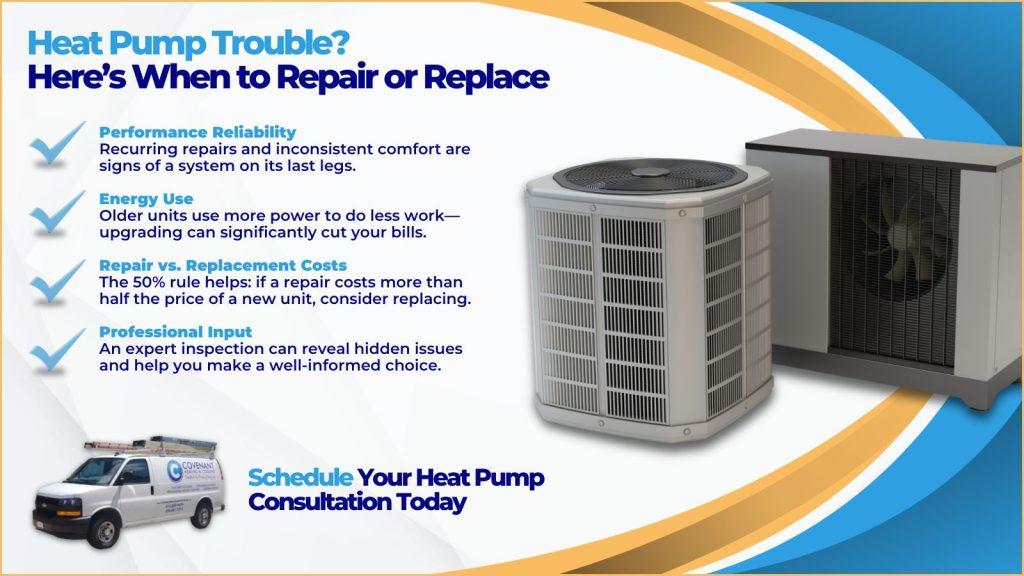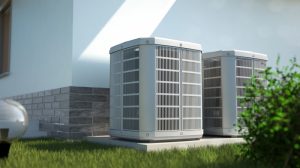If your heat pump is acting up, you might be facing a tough decision: should you repair it or invest in a new system? While repairs may seem like the cheaper and easier option, replacing an aging or inefficient heat pump could save you money in the long run. Is it time for heat pump replacement in Nashville, TN? Here are five key factors to consider when making this important decision.

1. Age of the System
One of the most significant factors in determining whether to repair or replace your heat pump is its age. Most heat pumps have a lifespan of 10 to 15 years, with well-maintained units sometimes lasting up to 20 years. If your system is approaching or exceeding this range, replacement is likely the better option. Newer models are more energy-efficient, use environmentally friendly refrigerants, and offer advanced features that can improve comfort and reduce operating costs.
2. Maintenance History
How well your heat pump has been maintained over the years plays a major role in its longevity. Regular maintenance, including filter changes, coil cleaning, and refrigerant checks, can extend the lifespan of your unit. If you’ve kept up with these tasks and your heat pump has performed reliably, a repair might be a viable choice. However, if your system has had little to no maintenance and has developed significant issues, it may be time to consider scheduling professional heating maintenance service.
3. Cost of Necessary Repairs
When facing a repair, it’s crucial to compare the cost of fixing the unit to the cost of replacement. A good rule of thumb is the “50% rule”—if the repair costs more than 50% of the price of a new heat pump, replacement is the better investment. Additionally, if a major component like the compressor or reversing valve has failed, replacing the entire system may be more cost-effective than repairing a single expensive part.
4. Frequency of Repairs
An occasional repair is normal for any HVAC system, but if your heat pump has needed multiple fixes over the past few years, it may be reaching the end of its useful life. Frequent breakdowns not only indicate that the system is wearing out but also lead to mounting repair costs. If you find yourself calling a technician every few months, investing in a new, reliable system could save you money and prevent the inconvenience of heating breakdowns during the cold months.
5. Inefficiency and Rising Energy Bills
Older heat pumps tend to become less efficient over time, leading to higher electricity bills. If you’ve noticed a steady increase in your energy costs despite normal usage, your heat pump may be struggling to operate efficiently. Advances in technology have made modern heat pumps significantly more energy-efficient, meaning a new system could lower your utility bills and help you avoid issues like heating systems running on the struggle bus.
The Bottom Line: Repair or Replace?
If your heat pump is relatively new, has been well maintained, and the repair costs are minor, fixing it might be the best option. However, if your unit is old, requires frequent repairs, or is causing your energy bills to spike, replacing it will likely provide better comfort and long-term savings.
Still unsure? Consulting an HVAC professional can help you assess your specific situation and make an informed decision. Whether you choose to repair or replace, ensuring your home stays comfortable and energy-efficient should always be the priority.
Frequently Asked Questions
Question: How long should a heat pump typically last before replacement is needed?
Answer: Most heat pumps have a lifespan of about 10 to 15 years, with well-maintained units sometimes lasting up to 20 years. If your system is nearing or beyond this range, replacement might be the more sensible long-term solution.
Question: What is the “50% rule” regarding repair costs for heat pumps?
Answer: The “50% rule” suggests that if the cost of repairing your heat pump exceeds 50% of the cost of purchasing a new unit, it’s usually more economical to invest in a replacement instead of continuing to repair it.
Question: Can repeated repairs signal that I should replace my heat pump?
Answer: Absolutely. If your heat pump requires frequent repairs, that’s a strong indicator it’s nearing the end of its useful life. Replacing it can save you from rising costs and unexpected breakdowns.Question:Are there energy-saving benefits to replacing an older heat pump?
Answer: Yes. Older heat pumps usually become less efficient over time, resulting in higher energy bills. Newer models are far more efficient, which can lower utility costs and justify the investment in a new system.
Covenant Heating and Cooling is your trusted resource for reliable HVAC, electrical, and water heater services in Nashville, TN. We are “Dedicated to the Promise of Serving You!” Contact us today.

